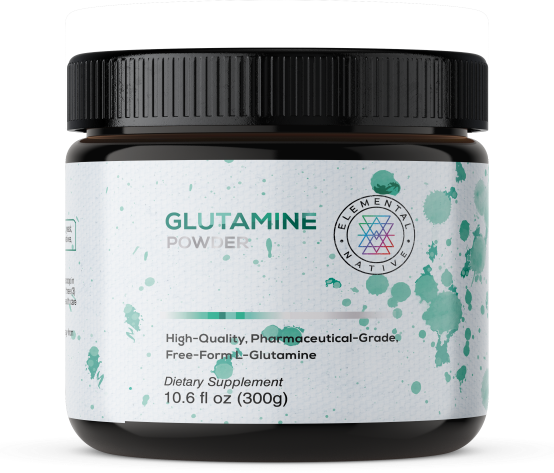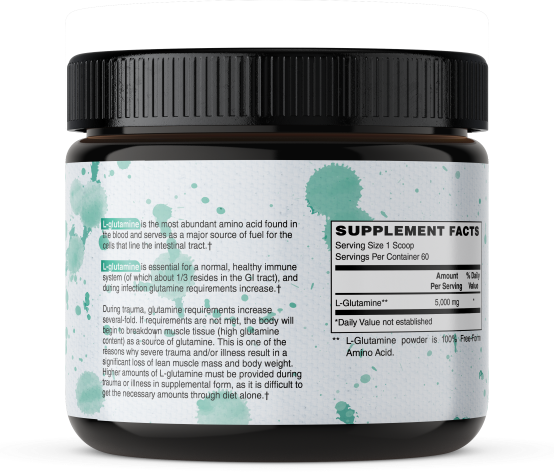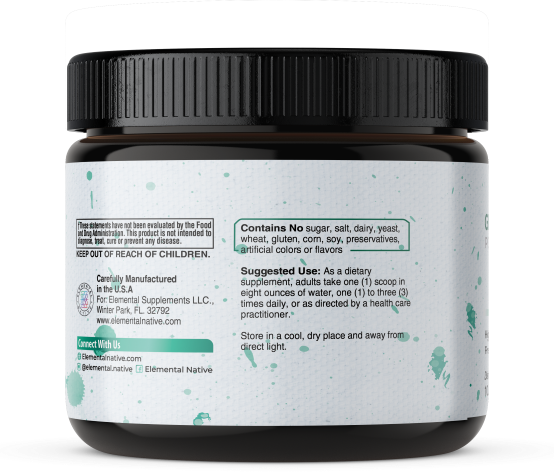-
DETAILS
L-Glutamine is an important amino acid with many functions in the body. It is a building block of protein and critical part of the immune system.*
What’s more, glutamine has a special role in intestinal health. It is a critical fuel source for immune cells, including white blood cells and certain intestinal cells. Glutamine's immune system benefits are related to its role in intestinal health. In the human body, the intestines are considered the largest portion of the immune system. This is because of the many intestinal cells with immune functions, as well as the trillions of bacteria that live in your intestines and impact your immune health.*
Glutamine is an important energy source for intestinal and immune cells. It also helps maintain the barrier between the inside of your intestines and the rest of your body, thereby protecting against a leaky gut. This prevents harmful bacteria or toxins from moving from your intestines into the rest of your body.*
Additionally, it is important for the normal growth and maintenance of the cells in the intestine. Due to the major role of the intestines in the immune system, glutamine benefits your overall immune health by supporting the intestinal cells.*
-
DIRECTIONS
Suggested Use:
As a dietary supplement, adults take one (1) scoop in eight ounces of water, one (1) to three (3) times daily, or as directed by a health care practitioner.
-
WHAT'S IN IT
L-Glutamine is an amino acid. Amino acids are molecules that play many roles in the body. Their main purpose is to serve as building blocks for proteins.
 Non GMO
Non GMO Hormone free
Hormone free Gluten free
Gluten free Dairy free
Dairy free Keto
Keto Paleo
Paleo 0 Sugars
0 SugarsKEY INGREDIENT
Glutamine
Glutamine is an important amino acid with many functions in the body. It is a building block of protein and critical part of the immune system. Our glutamine is the highest quality, pharmaceutical grade, freeform L-glutamine available.*

GLUTAMINE BENEFITS
-
1. STRENGTHENS
THE IMMUNE SYSTEM -
2.SUPPORTS
GUT HEALTH -
3.PROMOTES
MUSCLE RECOVERY -
4.PROMOTES
CARDIOVASCULAR HEALTH -
5. SUPPORTS
PROPER HYDRATION -
6.IMPROVES
BRAIN HEALTH + MOOD
-
Glutamine is the main fuel source for your body’s lymphocytes, white blood cells that fight infection and disease. When we’re sick or injured, glutamine levels decline, reducing the immune cells’ ability to defend your body. Studies show glutamine can improve recovery times and reduce complications when you’re sick.*
-
Glutamine is essential for a normal, healthy immune system (of which about 1/3 resides in the GI tract), and during infection glutamine requirements increase. The amino acid helps maintain your intestinal lining, ensuring your body absorbs the nutrients it needs — supporting good health and protecting against serious problems like leaky gut syndrome. Our gut is the largest organ in the immune system, which is why some scientists believe that glutamine may support better immunity.*
There’s evidence that glutamine supplements may also benefit people with gut conditions, like Crohn’s disease, celiac disease, and gut inflammation.* -
Glutamine is necessary to maintain muscle protein. Studies show when supplementing with glutamine, athletes had less muscle soreness and strength loss. It also may reduce muscle damage and exercise performance as well, but research into these effects is ongoing. During trauma, glutamine requirements increase several-fold. If requirements are not met, the body will begin to break down muscle tissue (high glutamine content) as a source of glutamine. This is one of the reasons why severe trauma and/or illness result in a significant loss of mean muscle mass and body weight.*
-
New evidence shows that glutamine also plays a role in cardiovascular health. Glutamine serves as a substrate for the synthesis of DNA, ATP, proteins and lipids. Additionally it seems to have potent antioxidant and anti-inflammatory effects that can reduce risk factors for cardiovascular disease, such as high blood pressure, high cholesterol, obesity and diabetes.*
-
Hydration plays a key role in supporting the recovery process. Studies have shown that dehydration can increase perceived pain associated with delayed onset muscle soreness, and exacerbate muscle soreness post workout. Recent studies show that glutamine promotes rehydration by enhancing electrolyte and water absorption, due to its ability in rebuilding intestinal lining, reducing hyperpermeability.*
In a study published in the Journal of the International Society of Sports Nutrition, results found that time to exhaustion was significantly reduced and performance levels were significantly improved in the subjects who received higher concentrations of glutamine. Glutamine uptake by the skeletal muscles resulted in greater sodium uptake. The enhanced sodium uptake by skeletal muscle may have contributed to a reduction in fatigue by maintaining strength and efficiency of muscle contractility.* -
In the brain, glutamine is a substrate for the production of both excitatory and inhibitory neurotransmitters (glutamate and gamma-aminobutyric acid, popularly known as GABA). Glutamine is also an important source of energy for the nervous system. If the brain is not receiving enough glucose, it compensates by increasing glutamine metabolism for energy, hence the popular perception of glutamine as "brain food" and its use as a pick-me-up. Glutamine users often report more energy, less fatigue and better mood.*



















